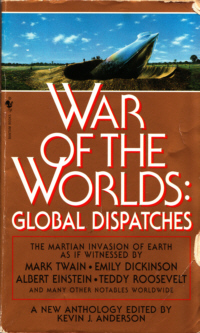The War of the Worlds Global Dispatches edited by Kevin J. Anderson (1996)

Did the Martians only land in England? Well, if we are to believe the dispatches in this book, then we can only conclude
that the Martian invasion was on a far grander scale than previously imagined. In support of this contention, editor Kevin J.
Anderson has assembled an extraordinary collection of stories that not only span the globe, but also reveal that the Martians
encountered a great many famous persons of the age, amongst them, Mark Train, Albert Einstein and Jules Verne. Of course it's
all as much a fantasy as the original novel, but the central conceit, that a Martian invasion did take place, is carried off
with a delightful air of mock seriousness that propels the reader breathlessly from story to story and place to place. These
varied locations, which range as far afield as China, France, Russia and America impart a great deal of freshness to the core
concept and whilst the stories do not all connect entirely seamlessly (inevitably from a collection like this there are
contradictions) there is an enormous amount of fun to be had from seeing the Martian invasion through fresh eyes.
It is a fascinating intellectual exercise to imagination how a Martian invasion would have altered history, propelling some
to greatness and reducing others who might have been great to obscurity. Mark W. Tiedemann plays with this idea to great
effect in his story Resurrection, which stars Leo Tolstoy but also features in passing a certain Iosef Vissarionovich. His
more familiar nom de guerre is never mentioned and if you're not sure who he is, I'll leave it to you or Google to figure
it out, but it is a neat inversion of this type of story (which so often features the good and the great triumphing against
adversity) to instead postulate that a great (and I use the word carefully) figure would find their ambitions thwarted and
would simply melt away into total anonymity.
There are some writers of considerable calibre assembled in this book, each of whom has clearly taken great pains to get
under the skin of their protagonists. In Blue Period, Daniel Marcus brings us the adventures of Pablo Picasso in Paris,
as the great artist finds inspiration from the Martian onslaught, while Dave Wolverton's After a lean winter finds Jack
London regretting his decision to seek sanctuary in the Yukon, as it proves far from the safe haven he imagined. Indeed,
this story breaks free intriguingly from the established lore that the Martians all died of infections by suggesting that
they might have fared better in colder climes. In fact several stories find inventive ways of breaking free of the bonds
of the original story, none more so than Connie Willis' highly surreal attempt to weave the life of Emily Dickinson into
the narrative, Willis not in the least deterred by the fact that Dickinson died several years before the invasion.
This is a great book that no War of the Worlds fan should be without, and I for one would love to see some enterprising
movie producer take out an option. It would make a superb anthology movie, with animation perhaps proving the most effective
avenue. Weave together half a dozen radically different animation styles (Japanese animation would be an exciting form) and
it would make for a truly exciting production.
Here is a full list of the stories contained within.
The Roosevelt dispatches by Mike Resnick. Teddy Roosevelt encounters and shoots a Martian in Cuba. But are there more of
these strange beasts to be hunted down?
Canals in the sand by Kevin J. Anderson. Percival Lowell becomes convinced Martians are on the way and attempts to
entice them to land in the Sahara by igniting a huge signal fire.
Foreign Devils by Walter Jon Williams. The Dowager Empress of China battles both court intrigues and Martians to
rescue her country from a new breed of foreign devil.
Blue Period by Daniel Marcus. Pablo Picasso witnesses the destruction of Paris at the hands of the Martians.
The Martian invasion journals of Henry James by Robert Silverberg. Purporting to be the previously unpublished journal
entries of Henry James, this places the writer in the company of H.G. Wells as the Martian invasion begins in England.
The true tale of the final battle of Umslopogaas the Zulu by Janet Berliner. A letter written by Winston Churchill
to H. Rider Haggard reveals an encounter with Martians and Haggard's heroic Zulu warrior creation, Umslopagas.
Night of the Cooters by Howard Waldrop. A Texas Ranger rallies his town to fight a Martian landing.
Determinism and the Martian war, with relativistic corrections by Doug Beason. Albert Einstein reveals a hitherto
unknown heroic streak, and gets a close up glimpse of Martian technology.
Soldier of the Queen by Barbara Hambly. Rudyard Kipling discovers that the Martian invasion has serious implications
for the British Empire and its hold over its subject nations.
Mars: The home front by George Alex Effinger. Edgar Rice Burroughs meets his fictional creation John Carter of Mars
and learns of the Martian threat to earth.
A letter from St. Louis by Allen Steele. A young reporter writes to his sister, telling of an encounter with his
employer Joseph Pulitzer, during a Martian assault on the city of St. Louis.
Resurrection by Mark W. Tiedemann. Leo Tolstoy organises relief and resistance to the Martian invasion, but there
are tensions between the social classes as the Martian invasion threatens more than life and limb.
Paris conquers all by George Benford and David Brin. Jules Verne is caught up in the Martian invasion of Paris and
comes up with a novel way of attacking the invaders.
To Mars and providence by Don Webb. A young H. P. Lovecraft has a mystical encounter with the Martians.
Roughing it during the Martian invasion by Daniel Keys Moran and Jodi Moran. Mark Twain organises the capture of some living Martians.
To see the world end by M. Shayne Bell. Joseph Conrad seeks sanctuary from the invasion in the Kongo Free State.
After a lean winter by Dave Wolverton. Jack London and a group of snowbound trappers make sport of a captured Martian.
The soul selects her own society: invasion and repulsion: a chronological reinterpretation of two of Emily Dickinson's
poems: a Wellsian perspective by Connie Willis. The title says it all. A very strange tale told in a purposefully straight-laced academic style.
Afterward: Retrospective by Gregory Benford and David Brin. Jules Verne gets the last word on the Martian invasion.
|





